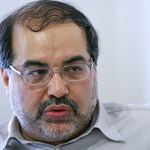Internalizing Iranophobia

On Saturday, UAE Foreign Minister Sheikh Abdullah bin Zayed al-Nahayan said that his country will respect any international sanctions that could be imposed by the UN Security Council on Iran. Nevertheless, he added he hoped before reaching that phase, the international community would find a way to solve the dispute over Iran’s nuclear program through diplomatic means.
Masoud Edrisi, Middle East Affairs analyst and Iran’s former ambassador to Lebanon believes:
Internalizing Iranophobia among Middle East states has been part and parcel of US policy since the 1979 Islamic Revolution in Iran. An Arab world in constant fear from Iran will fall for any US plan to curb Iran’s so-called agenda to extend its [Shiite and Persian] hegemony over the region.
In tightening the cordon around Iran, intensified sanctions are Americans’ favorite option. But sanctions would not be as effective as desired if Arab states of the Persian Gulf did not support Washington. So far, Arab countries have vacillated over the sanctions, showing support for US pressures and opposing further punitive measures at times. For Iran, it is necessary to bring optimism to the region through trust-building policies. That is the only way it can counter the US Iranophobia campaign. A diametrical relationship exists between Iran’s efforts to gain Arab trust and Americans’ hoax to bring Arabs on board.
There is however doubts that to what extent Arabs are honest when they express anti-Iran remarks. United States has never stopped pressuring these countries to join the anti-Iran camp, so hostility towards Iran may not be what Arab countries really want.
Iran and Arab countries of Middle East, particularly the Persian Gulf region, can turn into exemplary partners. Regional, religious and cultural commonalities provide both sides of the Persian Gulf with ample opportunities to resume fruitful relations. Bilateral ties will act as the best antidote against US destructive measures. All we need to do is to polish a few policies and remarks.

